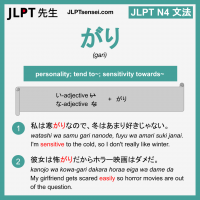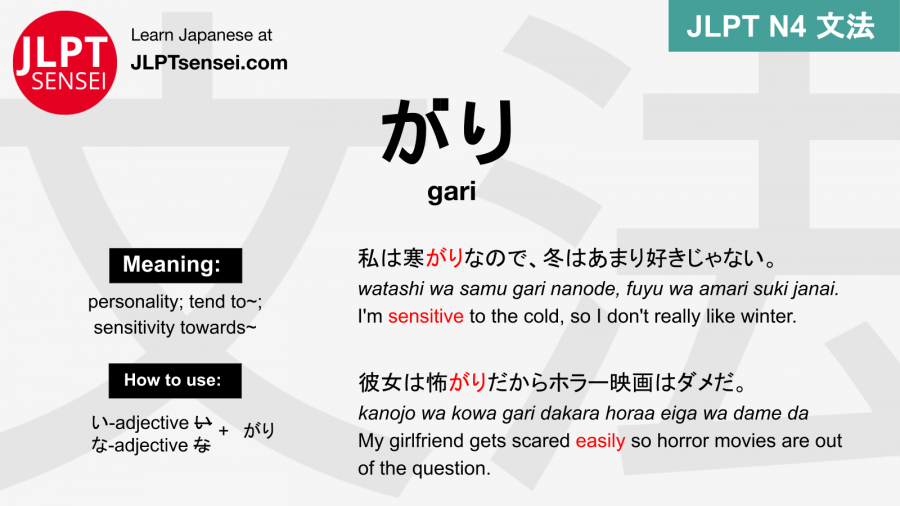Aprende gramática del idioma Japonés: がり (gari). Significado: someone tends to; has a tendency to; has a sensitivity to~.
Based from がる
Before starting this lesson, you may want to read the lesson for がる (garu) lesson first.
がる (garu) is used to say that someone is appearing to be a certain way. がり (gari) changes the meaning to describe a personality, tendency, or sensitivity towards something.
Therefore, while the sound is similar, both grammar points are saying quite different things.
What is different?
While がる (garu) is usually used when talking about others, がり (gari) can be used to talk about both others and oneself.
Meaning 1) Describe Personality
scaredy cat; someone who is easily scared; tends to scare easily
shy person; someone who tends to be shy
lonely person; person who feels lonely easily
to bluff; someone who tends to look tough
Someone who tends to want to stand out
Note that this form is changed from たがる (tagaru), which means to want to do~ when talking of othersMeaning 2) Sensitivity Towards Something
Someone who is sensitive to the cold.
Someone who is sensitive to heat.
Extra Study Notes
When talking about someone’s personality, Japanese people will usually add 屋 (ya) at the end.
Another option, which is more friendly, is to add 屋さん (yasan) at the end instead.
shy person (friendly way of saying)

Click the image to download the flashcard.
Download all N4 grammar flashcards.

Download our complete
JLPT N4 Grammar Master E-book.
Access ALL extra downloads, ebooks, and study guides by supporting JLPT Sensei on Patreon.
がり - Oraciones de ejemplos 例文
Cada oración de ejemplo incluye ayudas como la lectura (hiragana) en Japónes, la lectura en romaji, y la traducción en Español.
Da clic en el siguiente botón rojo para alternar todas las ayudas, o puedes dar clic en los botones individuales para mostrar únicamente las que desees ver.
Ejemplo #1
彼女は怖がりだからホラー映画はダメだ。
Ejemplo #2
私は寒がりなので、冬はあまり好きじゃない。
Ejemplo #3
このバンドが解散したらファンが悲しがりだろう。
Ejemplo #4
かっこいい彼をゲットしたらみんな羨ましがりだろうな。
Ejemplo #5
人々が不安がりので政府はその事実を隠していた。
Ejemplo #6
あんな所に駐車したら近所の人に迷惑がりよ。
Ejemplo #7
彼は彼女が欲しがりバッグを買ってあげた。
Vocabulario 語彙
| Kanji 漢字 |
Kana カナ |
English 英語 |
|---|---|---|
| 怖い | こわい | scary |
| 恥ずかしい | はずかしい | embarrassing |
| 寂しい | さびしい | lonely |
| 強い | つよい | strong |
| 目立ちたい | めだちたい | to want to stand out |
| 寒い | さむい | cold (weather) |
| 暑い | あつい | hot (weather) |
| 彼女 | かのじょ | she; girlfriend |
| 映画 | えいが | movie |
| 冬 | ふゆ | winter |
Ver todas las lecciones de gramática del JLPT N4



